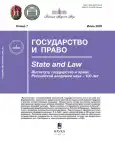Criminalistics as a theoretical and applied basis for ensuring national media security
- Authors: Galyashina E.I.1
-
Affiliations:
- Kutafin Moscow State Law University
- Issue: No 7 (2025)
- Pages: 106-114
- Section: Strengthening of legality and struggle with criminality
- URL: https://journal-vniispk.ru/1026-9452/article/view/306367
- DOI: https://doi.org/10.31857/S1026945225070113
- ID: 306367
Cite item
Abstract
The article examines the most significant challenges to national security in modern conditions of the world order transformation, which include destructive informational and psychological impact, large-scale falsification of history, fake news, propaganda of misanthropy, russophobia, manipulation of the spiritual sphere using social engineering, promotion of the cult of consumption in the mass media and stereotypes that reduce a person’s ability to think critically, inculcation of legal nihilism, hatred and hostility towards state authorities, pejorative attitude to the idea of patriotism, etc. The techniques of aggressive destructive influence on the worldview and cognitive-mental sphere of a person in the information space are camouflaged under the promotion of innovative technologies, including using artificial intelligence, pseudoscientific theories, alien cultural concepts. Their veiling requires creation of adequate mechanisms for searching, detecting, fixing, removing and investigating traces of criminally destructive communicative activity using information technology and the development of modern forensic techniques to prevent and neutralize mental and cognitive attacks on information and ideological security in order to protect national spiritual values. Criminalistics is considered by the author as a theoretical and applied basis that makes it possible to identify, neutralize and effectively prevent criminal hybrid threats in order to ensure national security in mass media.
About the authors
E. I. Galyashina
Kutafin Moscow State Law University
Author for correspondence.
Email: eigaljashina@msal.ru
9 Sadovaya-Kudrinskaya str., 125993 Moscow, Russia
References
- Bastrykin A. I. Lecture: “Digital technologies of modern criminalistics” // The legal thought. 2020. No. 3 (119). P. 161 (in Russ.).
- Bronnikov I. A., Gorbachev M. V. Political communication in a changing world: theory and practice. M., 2022. P. 278 (in Russ.).
- Galyashina E. I., Nikishin V. D. Information and ideological security in Internet media. M., 2023. Pp. 5–12, 26, 27 (in Russ.).
- Galyashina E. I., Nikishin V. D., Bogatyrev K. M. Standard criminalistic diagnostic complexes of criminogenic speech actions. 2021. No. 1 (65). Pp. 16–31 (in Russ.).
- Galyashina E. I., Nikishin V. D., Bogatyrev K. M., Pfeiffer E. G. Faking as a means of information warfare in online media: scientific and practical textbook. M., 2024. P. 11 (in Russ.).
- Gostev A. A. Manipulation of the inner world of a personality: a spiritual and moral aspect (on the example of screen images) // Psychological impact in interpersonal and mass communication. M., 2014. P. 55 (in Russ.).
- Korukhov Yu. G. Criminalistic diagnostics in the investigation of crimes. M., 1998. P. 73 (in Russ.).
- Criminalistics: textbook for bachelors and specialists / ed. by E. P. Ishchenko. M., 2022. P. 539 (in Russ.).
- Criminalistic tactics: history, current state and development prospects (dedicated to the 85th anniversary of the birth of Professor V. I. Komissarov): materials of the International Scientific and Practical Conference / ed. by Ya. V. Komissarova. M., 2024. P. 5 (in Russ.).
- Lebedev A. N. Information uncertainty as a mechanism of psychological impact // Psychological impact in interpersonal and mass communication. M., 2014. Pp. 32– 44 (in Russ.).
- Medushevsky A. N. Cognitive warfare: social control, mind control and a tool of global domination. Part 1 // Questions of theoretical economics. 2023. No. 2. Pp. 85–98 (in Russ.).
- Medushevsky A. N. Cognitive warfare: social control, mind control and a tool of global domination. Part 2 // Questions of theoretical economics. 2023. No. 3. Pp. 92–107 (in Russ.).
- Pankina I. A. Modern criminalistics as a self-organizing knowledge system // Criminalistic tactics: history, current state and development prospects (on the 85th anniversary of the birth of Professor V. I. Komissarov): materials of the International Scientific and Practical Conference / ed. by Ya. V. Komissarova. M., 2024. Pp. 142, 146 (in Russ.).
- Spirev D. V. Criminalistic aspects of monitoring the Internet space for the investigation of crimes related to insults // Herald of the Kazan Legal Institute of the Ministry of Internal Affairs of Russia. 2024. No. 1 (55). Pp. 118–124 (in Russ.).
- Tsyparkov N. G. Criminalistic monitoring in countering economic crime // Problems of combating crime and training personnel for law enforcement agencies: International Scientific and Practical Conference (Minsk, April 4, 2013): abstracts / editorial board.: V. B. Shabanov (editor-in-chief) et al. Minsk, 2013. Pp. 123, 124 (in Russ.).
- Yablokov N. P. The importance of criminalistics in law enforcement and in the training of lawyers of a broad professional profile // Criminalistics in the law enforcement system: proceedings of the conference. Moscow, Lomonosov Moscow State University. October 27–28, 2008. M., 2008. Pp. 11, 13 (in Russ.).
- Claverie F. du Cluzel. “The Cognitive Warfare Concept”. URL: https://www.innovationhub-act.org/sites/default/files/2022-02/CW%20article%20Claverie%20du%20Cluzel%20final_0.pdf
Supplementary files










